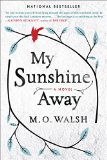Summary | Excerpt | Reviews | Beyond the book | Read-Alikes | Genres & Themes | Author Bio

In an author's note, Marcus J. Guillory opens his debut novel with a personal revelation: he traces his heritage to the American Creoles, known for their powerful story-telling. Thus, he subtly implies, we are in good hands for the story to come. And we are.
Red Now and Laters is a gorgeous, visceral coming-of-age story about Ti'John (short for Petit John, fully John Paul Boudreaux Jr.), a young black boy descended from the Creoles. He is growing up on the gritty streets of South Park, Houston in the '70s and '80s. A once hopeful post-WWII development, South Park has "slammed its brakes and skidded violently into a telephone pole called 'progress.'" White flight and Reaganonomics have ensured that economic progress doesn't have much to do with Ti'John's life.
From an early age, Ti'John is exposed to the realities of urban blight, where addiction, violence, poverty, mental illness and death aren't cloistered away but out in the open, right on the street, and gunshots provide the backdrop for rides to school. The novel opens in 1977 with a flood, the streets filling up with "brown murky murk." A young mother loses her infant in the fast-moving current, setting the tone for a story that does not shy away from the brutality of life.
Being raised by a fearful, Catholic mother – "her immediate fear was the very neighborhood we lived in" – and a drinking, gambling, rodeo star father, Ti'John must learn to walk a delicate line. His mother's rules are simple and firm: behave, no hanging around with the neighborhood "hoodlums," be a good Catholic and an upstanding citizen. His father's are slightly more diffuse, and sometimes scary: be a man, learn to win, follow in your ancestors' footsteps. In the case of the latter, Ti'John will have to figure out what that means.
Ti'John's daily life is in one sense the stuff of all boys – learning to stand up to bullies; bartering in the schoolyard for the coveted red candies, Now and Laters; and trading his first kiss for a cassette tape of "Prince slow jams." The boy's life is also deeply mysterious. Who is the strange-looking man who always seems to show up in times of distress, and why doesn't anyone else seem to see him? Why does his father have a habit of hiding out and talking to himself? Is he crazy? Eventually, Ti'John's father will let him in on the secret the reader knows all along: the boy is a traiteur (the Creole word for "healer"), possessed of a gift for healing that his father also has. This fact, and the discovery of the identity of the strange-looking man, lend the novel a delicious bit of magical realism that doesn't seem in the least out of place.
With a luscious Louisiana Creole always percolating below the Southern-spiked black urban dialect, the language is as rich and textured as the landscape Guillory evokes, reminding one of Faulkner's famous line: "The past is never dead. It's not even past." The whole novel, in fact, can be read as an exploration of Faulkner's contention. Ti'John must learn to incorporate the past into his life, or else be haunted by it, in his case quite literally. Much as he might wish to turn a blind eye to the dark, violent, contentious history of his people and concentrate on running the block and "getting booty," Ti'John realizes early on that he must honor his heritage before he can make his own future.
Red Now and Laters closes with Ti'John (now Johnny) in his eighteenth year. Having watched him navigate the disparate forces in his life from age four, the reader can't help but say a reluctant goodbye after finishing this gorgeous novel. One can only hope that Guillory will feel inspired to check in with Johnny later in his life, and if he does, I'll be first in line at the bookstore.
![]() This review was originally published in The BookBrowse Review in May 2014, and has been updated for the
March 2015 edition.
Click here to go to this issue.
This review was originally published in The BookBrowse Review in May 2014, and has been updated for the
March 2015 edition.
Click here to go to this issue.

If you liked Red Now and Laters, try these:

by M.O. Walsh
Published 2016
Acutely wise and deeply honest, it is an astonishing and page-turning debut about the meaning of family, the power of memory, and our ability to forgive.

by Phil Hogan
Published 2016
In the tradition of Patricia Highsmith's Tom Ripley novels comes a deliciously unsettling tale of psychological suspense that delves into the mind of a man with a chilling double life.
Your guide toexceptional books
BookBrowse seeks out and recommends the best in contemporary fiction and nonfiction—books that not only engage and entertain but also deepen our understanding of ourselves and the world around us.